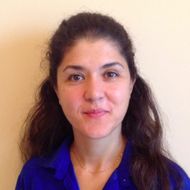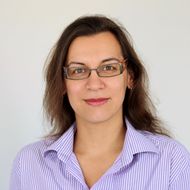‘Up and Ahead’: Students in New Master's Programme to Study Psychometrics and Developmental Sciences

Enrolment is underway for the HSE Institute of Education’s new Master's programme, Science of Learning and Assessment, which was developed at the intersection of developmental science, advanced methods of neuroscience and psychometrics, and the theory and practice of testing and measurement. Students will learn to assess human development and adjust the learning process, relying on evidence-based approaches of neuroscience and current concepts of measuring skills, personality characteristics, competencies, and other complex constructs.
Science of Learning and Assessment is one of the 14 HSE master's programmes that have been modernized this year. Since 2010, its predecessor—the Master’s programme in Measurements in Psychology and Education—trained specialists in the development of tests and surveys, selection tools and evaluation systems in fields such as education, including EdTech, HR and psychology. During this time, it received recognition in the academic community.
‘At first, we had to explain what measurement specialists in education and psychology do and who psychometricians are,’ says Inna Antipkina, the programme’s first graduate and now Academic Supervisor of Science of Learning and Assessment programme. ‘Even today, few people understand that the tests they develop are not primitive "guessing games", but rather very complex tools, often adaptive, with game design. One of our first visiting lecturers used to say that it takes three years and three million dollars to develop a good test.’
In Russia, the labour market for the programme’s graduates formed in parallel with the educational process. Psychometrics was included in the list of up-and-coming professions, and today the programme’s graduates not only work in education, but also in EdTech companies and HR, developing tests used in recruiting and personnel training and development. Studying in the programme has always been seen as rather difficult, with students who had come from undergraduate programmes in the humanities having to work especially hard to master statistics and mathematical methods. However, all of these efforts pay off with the strong demand they experience in the labour market.
Along with the measurement track, a new developmental sciences track taught entirely in English has been introduced this year.
The Laboratory for the Neurobiological Foundations of Cognitive Development joined in launching the programme, with the laboratory’s head Marie Arsalidou becoming an academic co-supervisor. Professor Arsalidou, who earned her PhD at the University of York, is a specialist in cognitive sciences and child development. Students in the Master's programme will now use EEG and MRI data, take into account neurobiology in assessment, study cognitive characteristics (e.g., during reading), and identify cognitive development disorders that hinder learning.
Marie Arsalidou, Academic Supervisor of the Master’s programme in Science of Learning and Assessment

At HSE University we value research evidence. Research from economists shows a high return on investment in education, and the earlier it starts, the higher it is. Education involves the process of teaching and learning, and learning is undoubtedly related to cognition, which in turn is linked to the brain and our biology. Therefore, to improve our teaching and learning practices we need to capitalize on advanced technologies and scientific methods that will help us answer tough questions concerning the interrelation of learning, the brain, cognition and biology.
Our master’s programme in Science of Learning and Assessment (SOLA) takes a unique developmental perspective on psychology, education, psychometrics, neuroscience, technology, and biology. For example, SOLA students can choose to create and validate educational technologies, identify developmental brain markers associated with cognitive abilities using magnetic resonance imaging (MRI), examine learning strategies using eye tracking and electroencephalography (EEG), develop models that link the brain and behaviour using machine learning approaches, etc. There are many questions to be answered, and it is an exciting time to do research. We created the SOLA programme for this reason, and we invite motivated people to join us in the quest for knowledge to improve the human potential and well-being in our society.
The Master's programme in Science of Learning and Assessment is thus based on a combination of psychometrics and developmental studies – two overlapping circles – and at their intersection there is an area of cognitive psychometrics where the methods used by educational researchers and neuroscientists complement each other. This has allowed the curriculum to be expanded, and students will be able to choose courses based on their preferences and immerse themselves either in developmental sciences or measurements in education – the development of tests, exams, monitoring, etc. Student internships will be arranged based on their preferences.
The new programme also features an increased number of credits for project work, including jointly with EdTech companies and the largest providers of HR solutions. There will be an increased number of projects in which students will be able to work as research assistants (e.g., projects of the School of Psychology are added to traditional projects in the Institute of Education), an increased number of courses on the creation of digital competencies (Python programming, machine learning and other tools relevant for analysts).
To apply for the programme, prospective students must pass a portfolio competition and submit certificates confirming their level of English language proficiency. Applicants are also invited to take a free short English-language course on the ethics of experiments with living beings. The portfolio competition involves a creative competition: a one-minute video on a topic of your choice: ‘How I would explain a difficult concept to a five-year-old (psychometrics, MRI)" / "How I would explain my perspectives on the programme to my grandmother."
Students holding bachelor’s degrees in any discipline are welcome to participate in the competition. The study process will be easier for those who have studied mathematical methods, statistics and psychology, while others will have the opportunity to master the relevant material from scratch.
Inna Antipkina, Academic Supervisor of the Master’s programme in Science of Learning and Assessment

We would like to see applicants who are interested in issues related to training and assessment but who have not yet decided on their professional identity. If a person works as an English teacher, considers that their lifetime profession, and just wants to study as a hobby, then he or she will feel uncomfortable in our programme. This is in contrast to those who are ready to change their educational and professional path, actively develop in a new field, and join a small but very friendly community of specialists in assessment and now also training. Those people should definitely apply to our programme.
While our programme involves participation in research projects, because that is valuable experience to have, the variety of career tracks available to students following graduation is much broader than science and research. Our graduates are already experiencing great demand among companies working in the field of EdTech and online training, as well as HR companies engaged in personnel training and development.
HSE University welcomes applicants from all over the world and offers not only different levels of study, but also different formats in English and Russian, online and offline. International applicants can apply for Bachelor’s and Master’s degree programmes in a separate admissions process for foreign applicants and receive scholarships with full or partial tuition fee coverage.
When applying to a Bachelor’s programme, including five English-taught programmes in Moscow, it is possible to submit international certificates you have received in English and mathematics, such as IELTS, TOEFL, A-Level and other international exams and they will be recognized by HSE University, so taking entrance exams in relevant subjects will not be required.
Undergraduate applicants can test their chances of admission now by taking mock tests. Master’s applicants also have the opportunity to get a preliminary assessment of their portfolio and communicate with their programme of choice online.
To learn more about HSE University, its admission process, or life in Moscow, please visit International Admissions website, or contact the Education & Training Advisory Centre. The staff are happy to advise applicants and their parents via e-mail at inter@hse.ru, by phone +7 (495) 531 00 59, or WhatsApp +7 (916) 311 85 21, as well as on social media in Russian and in English: Vkontakte, Facebook, Telegram and Instagram.
Inna Antipkina
Academic Co-supervisor of the Master’s Programme in Science of Learning and Assessment
Marie Arsalidou
Head of the Laboratory for the Neurobiological Foundations of Cognitive Development
See also:
Inverse Relationship Found between Propensity to Innovate and Academic Success
Mariia Evdokimova and Anastasia Stepanova, employees of HSE University’s Faculty of Economic Sciences, studied the connection between students’ personal characteristics and their desire to create something new. The researchers have found that students’ propensity to innovate lowers their GPA. The results of the work were published in the preprint ‘Students’ Propensity to Innovate: Correlates, Determinants, and Impact on GPA.’
Social Connections Help Women Achieve Academic Success
Social integration has different effects on the academic achievement of women and men. Researchers from HSE University’s Institute of Education studied the connections between academic performance and social integration among 4,500 young Russians. It turned out that this connection is much stronger than it might seem at first glance, and that it is more important for women. The results of the work were published in the Journal of Social and Personal Relationships.
A University's Special Status Is Correlated with a Substantial Increase in Salaries for Graduates
A university education is a highly sought-after commodity in Russia, yet the quality of universities and their programmes varies significantly. This gives rise to risks of inequality, both in the realm of education and in the labour market, and subsequently impacts the returns on higher education, which are manifested in the salaries earned by graduates. According to a study by Ilya Prakhov, Assistant Professor of the HSE Faculty of Economic Sciences, graduates from Russia’s top-tier universities enjoy a distinct advantage. The paper has been published in the International Journal of Educational Development.
HSE University and Moscow Planetarium Sign Cooperation Agreement
The parties will work to popularise science and conduct educational and research activities, including in the fields of astronomy, cosmonautics, and Earth science. The agreement also covers the implementation of joint practical programmes and internships for students.
HSE University and Agency for Strategic Initiatives Sign Cooperation Agreement
HSE University and the Agency for Strategic Initiatives (ASI) have agreed to cooperate in the development of new technologies, the digital transformation of the economy, and the social development of the country. The agreement was signed by HSE University Rector Nikita Anisimov and ASI Director General Svetlana Chupsheva at the St Petersburg International Economic Forum.
Basic, General, and Home-based: Why Families Choose to Homeschool and What Challenges They Face in Doing So
There are many reasons why families choose to homeschool their children, from wishing to personalise their education to protecting them from bullying to strengthening the family bond. Those who decide to switch to homeschooling can face quite a few challenges, both logistical and psychological, including criticism from family members. IQ.HSE presents a few facts on homeschooling in Russia based on a paper by researchers of the HSE Institute of Education.
Card Index: Uberisation of Education
Education is in the process of being partly reformatted into an on-demand service, with digital platforms quickly and efficiently matching teachers to students. This can make education more personalised and accessible and open up new professional development and money-making opportunities for teachers. But is an Uber-like model really good for education? The following discussion of uberisation in education is based on a paper by philosopher Timur Khusyainov, Deputy Dean of the Faculty of Humanities at the HSE Campus in Nizhny Novgorod.
HSE University and Sberbank Sign Cooperation Agreement
HSE University and Sberbank have entered into a cooperation agreement. The document was signed by Herman Gref, CEO and Chairman of the Executive Board of Sberbank, and HSE University Rector Nikita Anisimov. The agreement is aimed at the implementation of shared educational, research, career-guidance, awareness-raising, and informational projects.
Shattering the Family’s ‘Glass Ceiling’: Why Young People Go to University
Attitudes towards education are often inherited, with parents explaining to their children what university education can give them. They offer very pragmatic arguments—that higher education ensures a more successful career, interesting work and a good income. But there are also other arguments that should not be underestimated. At this time when many universities are holding open house, IQ.HSE draws on a study by HSE scholars Tatiana Chirkina and Amina Guseynova to explain the attitudes towards education that parents give their children and which considerations they might have overlooked.
Collective Conscious: Advantages and Drawbacks of Studying in Small Groups
Students can learn difficult material much more efficiently by collaborating than by studying individually. They help each other, share information, and build collective knowledge. However, things are not as simple as they may seem. Cooperation between students is effective for certain activities, but not others. As researchers from the HSE Institute of Education have shown, knowledge is absorbed more effectively through group work, but the same benefits are not found when it comes to the practical application of knowledge.


